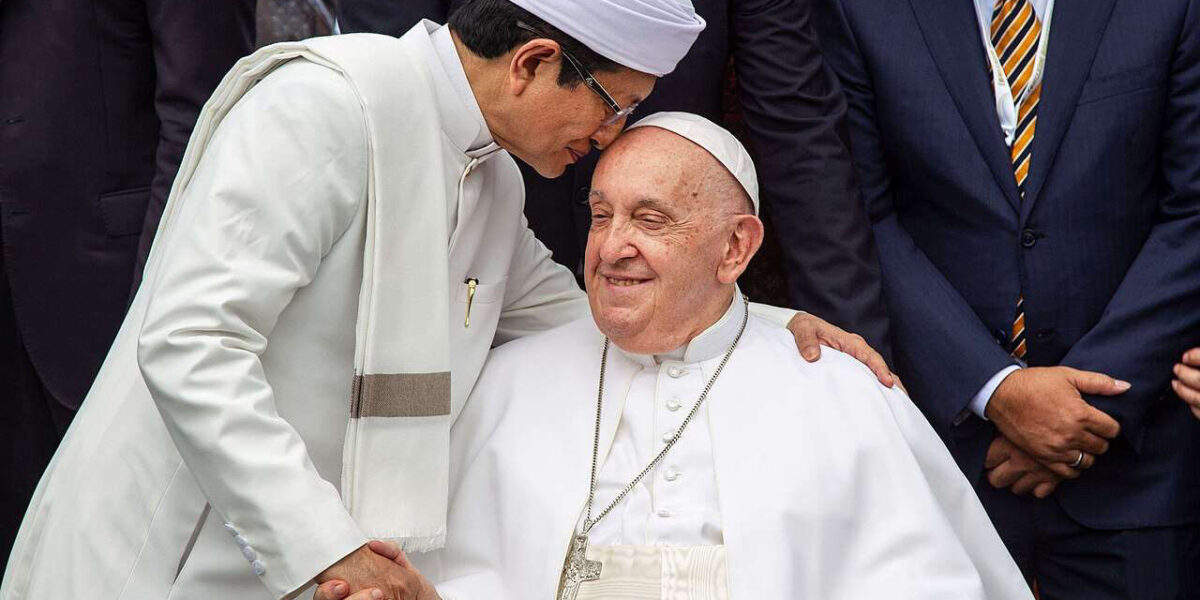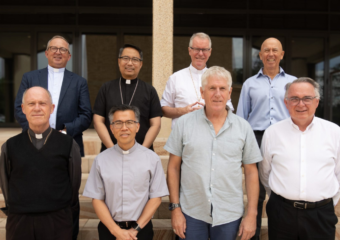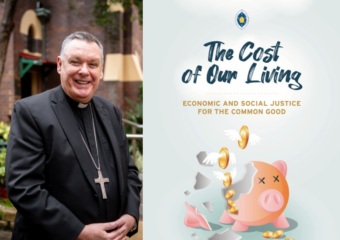Indonesia, the most populous Islamic nation, is home to about 13% of the world’s total Muslim population. Last September, Pope Francis visited Indonesia, and a powerful and moving photo captured the moment when the Indonesian Minister for Religious Affairs and Grand Imam of the powerful Istiqlal Mosque, Nasaruddin Umar, kissed Pope Francis on the top of his head.
In a world often marked by division and conflict, at times presented as religiously based, this image stands as a beacon of peace and fraternity between significant leaders of two of the largest world religions.
What made this image even more powerful was that it showed the Imam kissing the Pope, rather than the other way around. We had grown accustomed to seeing Pope Francis express affection for his fellow human beings, whether they be babies, prisoners, or people with disabilities.
Last year, after my ordination as Bishop of Cairns, I attended an orientation course in Rome for new bishops, known unkindly to many as “Baby Bishops School”. During an audience with the Holy Father, I had the opportunity to share with Pope Francis how powerful I found that gesture and image, and how it could be a great force for good and for peace.
The Holy Father’s response was passionate and profound. He emphasized that, first and foremost, before any consideration of religion or race, we are all fellow human beings. Our shared humanity, he stressed, is what we should celebrate, focus on, and build upon, rather than our differences.
His response resonated deeply with the message of his 2020 Encyclical, Fratelli Tutti, where he writes: “Of the counsels (Saint) Francis (of Assisi) offered, I would like to select the one in which he calls for a love that transcends the barriers of geography and distance, and declares blessed all those who love their brother ‘as much when he is far away from him as when he is with him’. In his simple and direct way, Saint Francis expressed the essence of a fraternal openness that allows us to acknowledge, appreciate and love each person, regardless of physical proximity, regardless of where he or she was born or lives.”
I find another deep resonance between these images of shared humanity and the words of Jesus in our Gospel this morning. The passage we have just heard could be described as Jesus’ affirmation of all humanity and a petition to the Father on our behalf. Elsewhere in John’s Gospel (3:16), we hear the profound words: “For God so loved the world that he gave his only Son, that whoever believes in him should not perish but have eternal life”.
Here, we gain a true sense of Jesus and how deeply he values the humanity that he came to share in. What an extraordinary and beautiful thing it is for us to hear such an affirmation of our shared human dignity.
In Jesus’ words, “Holy Father, I pray not only for these, but for those also who through their words will believe in me. May they all be one”. And again, “Father, I want those you have given me to be with me where I am, so that they may always see the glory you have given me because you loved me before the foundation of the world”.
Jesus’ petition for all future believers excludes no one; all are invited to faith. His prayer emphasizes His deepest longings for all humanity: unity, sanctification, knowledge of God, and ultimate participation in God’s glory.
Catholic Education is uniquely positioned to be a transformative force in helping to realize Jesus’ vision and destiny for every human person. It is called to shape young people who are not only intellectually capable but also deeply committed to building a world founded on shared fraternity, justice, and peace.
As we gather for this National Catholic Education Conference, we reflect on the awesome responsibility and privilege we share. We are called to be instruments of Christ’s prayer for unity, to foster environments where every student recognizes their inherent dignity and the dignity of others, regardless of background or belief. Our schools are not merely places of academic instruction; they are crucibles where the truth of Fratelli Tutti—fraternal openness, universal love, and a commitment to peace—are lived out daily.
My prayer is that at the conclusion of this conference we all leave refreshed and renewed in our dedication to form young people who will champion human dignity, bridge divides, and build bridges of understanding, with hearts and minds open to receiving the love and Good News of Jesus Christ. May our efforts in Catholic education truly reflect Jesus’ prayer “that they all may be one,” transforming our world into a more just, fraternal, and peaceful home for all God’s children. Bishop Joe Caddy




